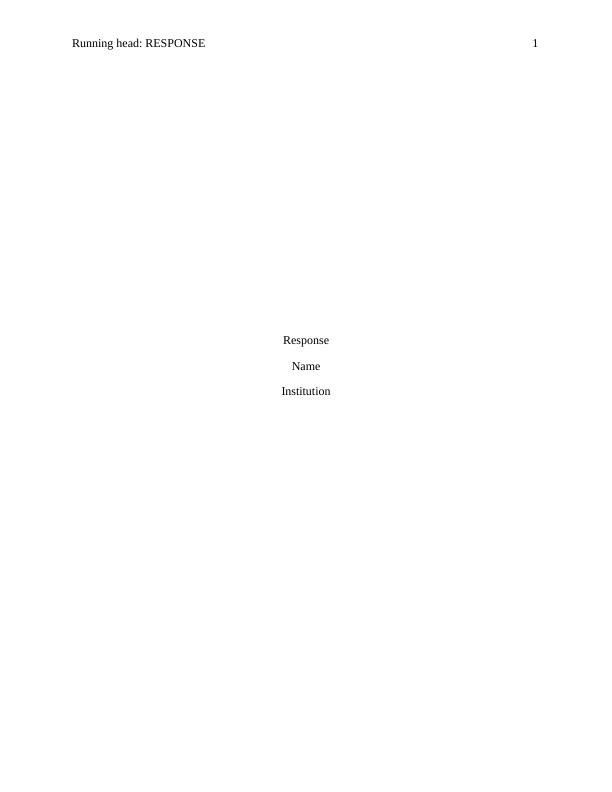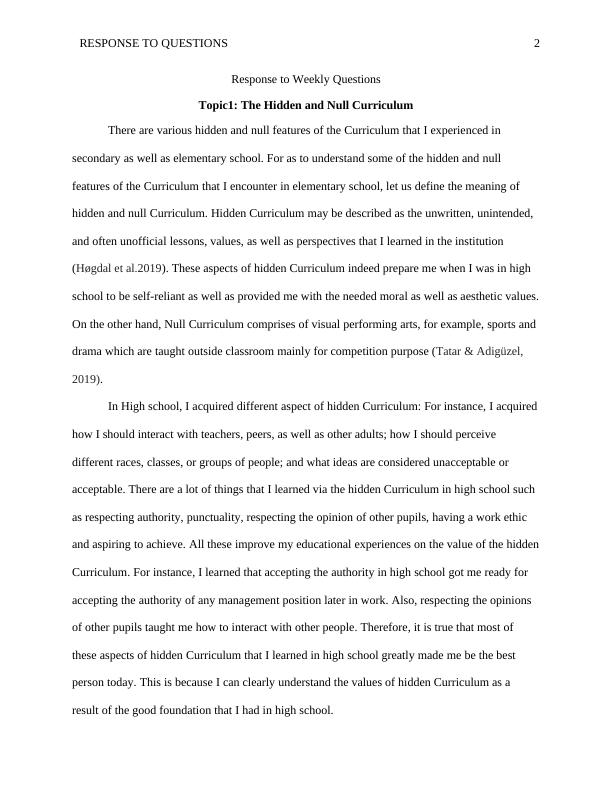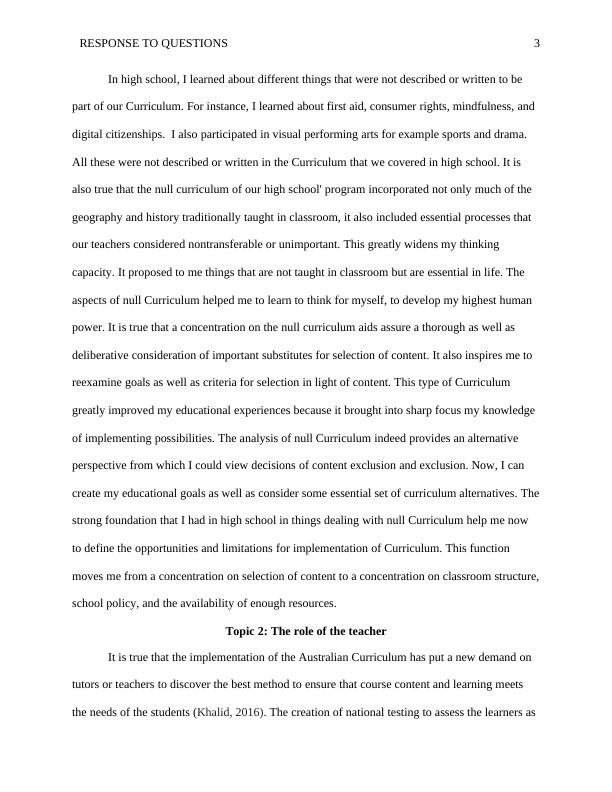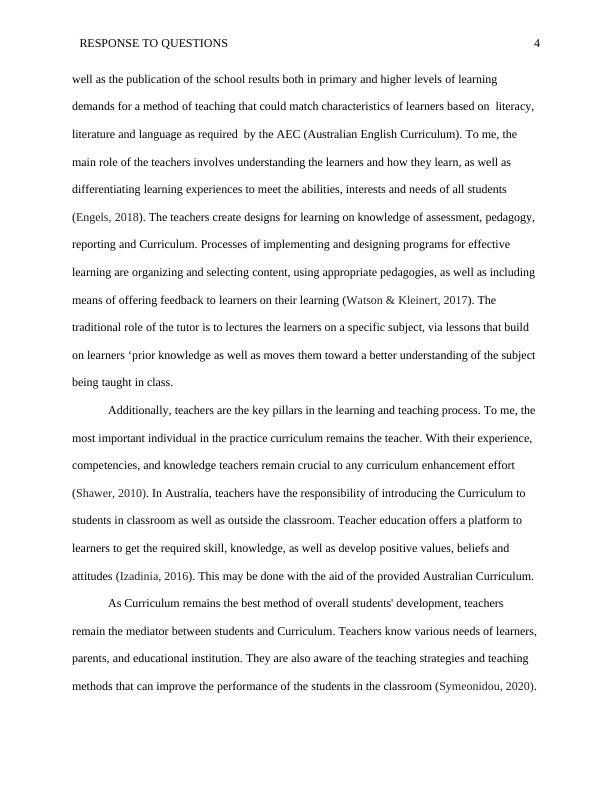The Assignment on Response to Questions
This article by Michael Apple explores the role of schools in creating a more just society and discusses the possibilities and limits of Marxist and socialist ideas in education.
12 Pages3733 Words32 Views
Added on 2022-08-30
The Assignment on Response to Questions
This article by Michael Apple explores the role of schools in creating a more just society and discusses the possibilities and limits of Marxist and socialist ideas in education.
Added on 2022-08-30
ShareRelated Documents
Running head: RESPONSE 1
Response
Name
Institution
Response
Name
Institution

RESPONSE TO QUESTIONS 2
Response to Weekly Questions
Topic1: The Hidden and Null Curriculum
There are various hidden and null features of the Curriculum that I experienced in
secondary as well as elementary school. For as to understand some of the hidden and null
features of the Curriculum that I encounter in elementary school, let us define the meaning of
hidden and null Curriculum. Hidden Curriculum may be described as the unwritten, unintended,
and often unofficial lessons, values, as well as perspectives that I learned in the institution
(Høgdal et al.2019). These aspects of hidden Curriculum indeed prepare me when I was in high
school to be self-reliant as well as provided me with the needed moral as well as aesthetic values.
On the other hand, Null Curriculum comprises of visual performing arts, for example, sports and
drama which are taught outside classroom mainly for competition purpose (Tatar & Adigüzel,
2019).
In High school, I acquired different aspect of hidden Curriculum: For instance, I acquired
how I should interact with teachers, peers, as well as other adults; how I should perceive
different races, classes, or groups of people; and what ideas are considered unacceptable or
acceptable. There are a lot of things that I learned via the hidden Curriculum in high school such
as respecting authority, punctuality, respecting the opinion of other pupils, having a work ethic
and aspiring to achieve. All these improve my educational experiences on the value of the hidden
Curriculum. For instance, I learned that accepting the authority in high school got me ready for
accepting the authority of any management position later in work. Also, respecting the opinions
of other pupils taught me how to interact with other people. Therefore, it is true that most of
these aspects of hidden Curriculum that I learned in high school greatly made me be the best
person today. This is because I can clearly understand the values of hidden Curriculum as a
result of the good foundation that I had in high school.
Response to Weekly Questions
Topic1: The Hidden and Null Curriculum
There are various hidden and null features of the Curriculum that I experienced in
secondary as well as elementary school. For as to understand some of the hidden and null
features of the Curriculum that I encounter in elementary school, let us define the meaning of
hidden and null Curriculum. Hidden Curriculum may be described as the unwritten, unintended,
and often unofficial lessons, values, as well as perspectives that I learned in the institution
(Høgdal et al.2019). These aspects of hidden Curriculum indeed prepare me when I was in high
school to be self-reliant as well as provided me with the needed moral as well as aesthetic values.
On the other hand, Null Curriculum comprises of visual performing arts, for example, sports and
drama which are taught outside classroom mainly for competition purpose (Tatar & Adigüzel,
2019).
In High school, I acquired different aspect of hidden Curriculum: For instance, I acquired
how I should interact with teachers, peers, as well as other adults; how I should perceive
different races, classes, or groups of people; and what ideas are considered unacceptable or
acceptable. There are a lot of things that I learned via the hidden Curriculum in high school such
as respecting authority, punctuality, respecting the opinion of other pupils, having a work ethic
and aspiring to achieve. All these improve my educational experiences on the value of the hidden
Curriculum. For instance, I learned that accepting the authority in high school got me ready for
accepting the authority of any management position later in work. Also, respecting the opinions
of other pupils taught me how to interact with other people. Therefore, it is true that most of
these aspects of hidden Curriculum that I learned in high school greatly made me be the best
person today. This is because I can clearly understand the values of hidden Curriculum as a
result of the good foundation that I had in high school.

RESPONSE TO QUESTIONS 3
In high school, I learned about different things that were not described or written to be
part of our Curriculum. For instance, I learned about first aid, consumer rights, mindfulness, and
digital citizenships. I also participated in visual performing arts for example sports and drama.
All these were not described or written in the Curriculum that we covered in high school. It is
also true that the null curriculum of our high school' program incorporated not only much of the
geography and history traditionally taught in classroom, it also included essential processes that
our teachers considered nontransferable or unimportant. This greatly widens my thinking
capacity. It proposed to me things that are not taught in classroom but are essential in life. The
aspects of null Curriculum helped me to learn to think for myself, to develop my highest human
power. It is true that a concentration on the null curriculum aids assure a thorough as well as
deliberative consideration of important substitutes for selection of content. It also inspires me to
reexamine goals as well as criteria for selection in light of content. This type of Curriculum
greatly improved my educational experiences because it brought into sharp focus my knowledge
of implementing possibilities. The analysis of null Curriculum indeed provides an alternative
perspective from which I could view decisions of content exclusion and exclusion. Now, I can
create my educational goals as well as consider some essential set of curriculum alternatives. The
strong foundation that I had in high school in things dealing with null Curriculum help me now
to define the opportunities and limitations for implementation of Curriculum. This function
moves me from a concentration on selection of content to a concentration on classroom structure,
school policy, and the availability of enough resources.
Topic 2: The role of the teacher
It is true that the implementation of the Australian Curriculum has put a new demand on
tutors or teachers to discover the best method to ensure that course content and learning meets
the needs of the students (Khalid, 2016). The creation of national testing to assess the learners as
In high school, I learned about different things that were not described or written to be
part of our Curriculum. For instance, I learned about first aid, consumer rights, mindfulness, and
digital citizenships. I also participated in visual performing arts for example sports and drama.
All these were not described or written in the Curriculum that we covered in high school. It is
also true that the null curriculum of our high school' program incorporated not only much of the
geography and history traditionally taught in classroom, it also included essential processes that
our teachers considered nontransferable or unimportant. This greatly widens my thinking
capacity. It proposed to me things that are not taught in classroom but are essential in life. The
aspects of null Curriculum helped me to learn to think for myself, to develop my highest human
power. It is true that a concentration on the null curriculum aids assure a thorough as well as
deliberative consideration of important substitutes for selection of content. It also inspires me to
reexamine goals as well as criteria for selection in light of content. This type of Curriculum
greatly improved my educational experiences because it brought into sharp focus my knowledge
of implementing possibilities. The analysis of null Curriculum indeed provides an alternative
perspective from which I could view decisions of content exclusion and exclusion. Now, I can
create my educational goals as well as consider some essential set of curriculum alternatives. The
strong foundation that I had in high school in things dealing with null Curriculum help me now
to define the opportunities and limitations for implementation of Curriculum. This function
moves me from a concentration on selection of content to a concentration on classroom structure,
school policy, and the availability of enough resources.
Topic 2: The role of the teacher
It is true that the implementation of the Australian Curriculum has put a new demand on
tutors or teachers to discover the best method to ensure that course content and learning meets
the needs of the students (Khalid, 2016). The creation of national testing to assess the learners as

RESPONSE TO QUESTIONS 4
well as the publication of the school results both in primary and higher levels of learning
demands for a method of teaching that could match characteristics of learners based on literacy,
literature and language as required by the AEC (Australian English Curriculum). To me, the
main role of the teachers involves understanding the learners and how they learn, as well as
differentiating learning experiences to meet the abilities, interests and needs of all students
(Engels, 2018). The teachers create designs for learning on knowledge of assessment, pedagogy,
reporting and Curriculum. Processes of implementing and designing programs for effective
learning are organizing and selecting content, using appropriate pedagogies, as well as including
means of offering feedback to learners on their learning (Watson & Kleinert, 2017). The
traditional role of the tutor is to lectures the learners on a specific subject, via lessons that build
on learners ‘prior knowledge as well as moves them toward a better understanding of the subject
being taught in class.
Additionally, teachers are the key pillars in the learning and teaching process. To me, the
most important individual in the practice curriculum remains the teacher. With their experience,
competencies, and knowledge teachers remain crucial to any curriculum enhancement effort
(Shawer, 2010). In Australia, teachers have the responsibility of introducing the Curriculum to
students in classroom as well as outside the classroom. Teacher education offers a platform to
learners to get the required skill, knowledge, as well as develop positive values, beliefs and
attitudes (Izadinia, 2016). This may be done with the aid of the provided Australian Curriculum.
As Curriculum remains the best method of overall students' development, teachers
remain the mediator between students and Curriculum. Teachers know various needs of learners,
parents, and educational institution. They are also aware of the teaching strategies and teaching
methods that can improve the performance of the students in the classroom (Symeonidou, 2020).
well as the publication of the school results both in primary and higher levels of learning
demands for a method of teaching that could match characteristics of learners based on literacy,
literature and language as required by the AEC (Australian English Curriculum). To me, the
main role of the teachers involves understanding the learners and how they learn, as well as
differentiating learning experiences to meet the abilities, interests and needs of all students
(Engels, 2018). The teachers create designs for learning on knowledge of assessment, pedagogy,
reporting and Curriculum. Processes of implementing and designing programs for effective
learning are organizing and selecting content, using appropriate pedagogies, as well as including
means of offering feedback to learners on their learning (Watson & Kleinert, 2017). The
traditional role of the tutor is to lectures the learners on a specific subject, via lessons that build
on learners ‘prior knowledge as well as moves them toward a better understanding of the subject
being taught in class.
Additionally, teachers are the key pillars in the learning and teaching process. To me, the
most important individual in the practice curriculum remains the teacher. With their experience,
competencies, and knowledge teachers remain crucial to any curriculum enhancement effort
(Shawer, 2010). In Australia, teachers have the responsibility of introducing the Curriculum to
students in classroom as well as outside the classroom. Teacher education offers a platform to
learners to get the required skill, knowledge, as well as develop positive values, beliefs and
attitudes (Izadinia, 2016). This may be done with the aid of the provided Australian Curriculum.
As Curriculum remains the best method of overall students' development, teachers
remain the mediator between students and Curriculum. Teachers know various needs of learners,
parents, and educational institution. They are also aware of the teaching strategies and teaching
methods that can improve the performance of the students in the classroom (Symeonidou, 2020).

End of preview
Want to access all the pages? Upload your documents or become a member.
Related Documents
Arts Education in Primary Schoollg...
|11
|3810
|100
My Statement of Purposelg...
|9
|2040
|222
Perspectives of Early Years Curriculum Assignment 2022lg...
|15
|4257
|37
Reflection of Worldview on Christianity and Sports Assessment 2022lg...
|8
|2140
|22
Research Paper of Sociologylg...
|4
|616
|303
Organisational Behaviour Reflectionlg...
|5
|1442
|440
